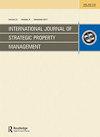肯尼亚公立大学的知识文化与员工绩效
IF 2
4区 管理学
Q3 MANAGEMENT
International Journal of Strategic Property Management
Pub Date : 2023-05-16
DOI:10.53819/81018102t2131
引用次数: 0
摘要
大学教育的作用被认为是至关重要的,因为它培养出具备知识和技能的人才,为国家的经济发展做出战略性贡献。大学作为“知识密集型”组织,其繁荣依赖于知识的生产和传播,并在很大程度上依赖于人力资源来促进、产生和传播知识。鉴于知识的丰富,知识的管理对机构来说变得很重要,这导致了一些新问题的发展,例如为共享知识和文化因素而创建的平台所扮演的角色。对文献的回顾表明,一个组织的文化影响着它如何能够创造一个合适的环境来提高员工的绩效。知识文化是指组织中价值观、信仰和规范影响利用知识获得竞争优势的方式的那一部分。支持推动知识创造和分享的知识文化更有利于建立强大的知识基础。进一步的文献回顾表明,在这些机构中,研究知识文化与员工绩效关系的实证研究数量有限。本文试图通过确定肯尼亚公立大学中这种关系的性质,为这一不断增长的知识体系做出贡献。这项研究是基于资源基础的观点。采用描述性调查设计,并采用描述性统计和推理统计对数据进行分析。目标人群包括495名雇员,他们来自肯尼亚10所公立大学,是根据他们的规模和年龄选择的。在肯尼亚的公立大学中,知识文化与员工绩效之间存在显著的正相关关系。本文章由计算机程序翻译,如有差异,请以英文原文为准。
Knowledge Culture and Employee Performance in Public Universities in Kenya
The role of university education is recognized as critical since it produces people equipped with the knowledge and skills to make strategic contributions toward the economic development of a country. Universities as ‘knowledge intensive’ organizations thrive on the production and dissemination of knowledge and rely heavily on the human resource component to facilitate, generate and disseminate it. The management of knowledge has become important to the institutions in view of its abundance and this has led to the development of several emerging issues such as the roles played by platforms created for sharing knowledge and cultural factors. Review of literature reveals that the culture of an organization affects how it is able to create a suitable environment to improve the performance of its employees. Knowledge culture represents that part of an organization in which its values, beliefs and norms influence the manner in which knowledge is utilized to attain competitive advantage. A knowledge culture that is supportive in promoting knowledge creation initiatives and sharing of the same is in a better position to build a strong knowledge base. Further review of literature shows that there are limited number of empirical studies that have been done to study the relationship between knowledge culture and employee performance in these institutions. This paper sought to contribute to this growing body of knowledge by determining the nature of this relationship in public universities in Kenya. The study was anchored on the resource-based view. Descriptive survey design was applied and descriptive and inferential statistics used to analyze the data. The target population consisted of 495 employees from 10 public universities in Kenya selected on the basis of their size and age. The study reported a significant and positive relationship between knowledge culture and employee performance when moderated with organizational structure in public universities in Kenya.
求助全文
通过发布文献求助,成功后即可免费获取论文全文。
去求助
来源期刊
CiteScore
4.00
自引率
18.50%
发文量
23
审稿时长
15 weeks
期刊介绍:
International Journal of Strategic Property Management is a peer-reviewed, interdisciplinary journal which publishes original research papers. The journal provides a forum for discussion and debate relating to all areas of strategic property management. Topics include, but are not limited to, the following: asset management, facilities management, property policy, budgeting and financial controls, enhancing residential property value, marketing and leasing, risk management, real estate valuation and investment, innovations in residential management, housing finance, sustainability and housing development, applications, etc.

 求助内容:
求助内容: 应助结果提醒方式:
应助结果提醒方式:


